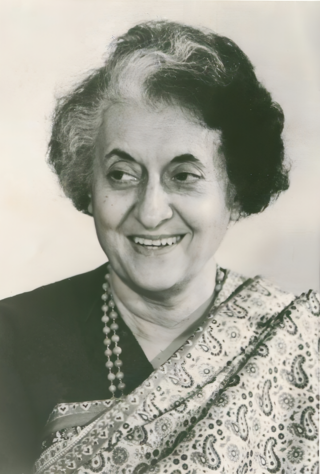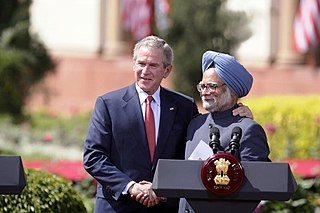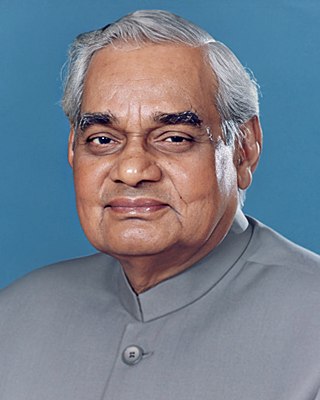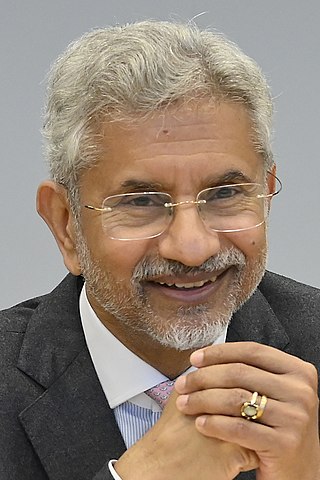
India, officially the Republic of India, has full diplomatic relations with 201 states, including Palestine, the Holy See, and Niue. The Ministry of External Affairs (MEA) is the government agency responsible for the conduct of foreign relations of India. With the world's third largest military expenditure, second largest armed force, fifth largest economy by GDP nominal rates and third largest economy in terms of purchasing power parity, India is a prominent regional power and a rising superpower.

Indira Priyadarshini Gandhi was an Indian politician and stateswoman who served as the 3rd Prime Minister of India from 1966 to 1977 and again from 1980 until her assassination in 1984. She was India's first and, to date, only female prime minister, and a central figure in Indian politics as the leader of the Indian National Congress. Gandhi was the daughter of Jawaharlal Nehru, the first prime minister of India, and the mother of Rajiv Gandhi, who succeeded her in office as the country's sixth prime minister. Furthermore, Gandhi's cumulative tenure of 15 years and 350 days makes her the second-longest-serving Indian prime minister after her father. Henry Kissinger described her as an "Iron Lady", a nickname that became associated with her tough personality since her lifetime.

The Bharatiya Janata Party is a political party in India and one of the two major Indian political parties alongside the Indian National Congress. Since 2014, it has been the ruling political party in India under the incumbent Prime Minister Narendra Modi. The BJP is aligned with right-wing politics, and its policies adhere to Hindutva, a Hindu nationalist ideology. It has close ideological and organisational links to the Rashtriya Swayamsevak Sangh (RSS) volunteer paramilitary organisation. As of September 2023, it is the country's biggest political party in terms of representation in the Parliament of India as well as state legislatures.

The Nuclear Suppliers Group (NSG) is a multilateral export control regime and a group of nuclear supplier countries that seek to prevent nuclear proliferation by controlling the export of materials, equipment and technology that can be used to manufacture nuclear weapons.

Edward Randall Royce is an American politician who served as a member of the United States House of Representatives from California from 1993 to 2019. A member of the Republican Party, Royce served as Chairman of the United States House Committee on Foreign Affairs from 2013 to 2019. He previously served as a member of the California Senate from 1982 to 1993.

India–Iran relations are the bilateral relationship between the Republic of India and the Islamic Republic of Iran. Independent India and Iran established diplomatic relations on 15 March 1950. However, ties between both ancient Persia and ancient India date back millennia. During much of the Cold War, relations between India and the erstwhile Imperial State of Iran suffered due to their differing political interests: India endorsed a non-aligned position but fostered strong links with the Soviet Union, while Iran was an open member of the Western Bloc and enjoyed close ties with the United States. While India did not welcome the 1979 Islamic Revolution, relations between the two states strengthened momentarily in its aftermath. However, Iran's continued support for Pakistan in the India–Pakistan conflict and India's close relations with Iraq during the Iran–Iraq War greatly strained bilateral ties. In the 1990s, both India and Iran supported the Northern Alliance against the Taliban in Afghanistan, the latter of which received overt Pakistani backing and ruled most of the country until the 2001 United States-led invasion. They continued to collaborate in supporting the broad-based anti-Taliban government, led by Ashraf Ghani and backed by the international community, until the Taliban captured Kabul in 2021 and re-established the Islamic Emirate of Afghanistan. India and Iran signed a defence cooperation agreement in December 2002.

The 123 Agreement signed between the United States of America and the Republic of India is known as the U.S.–India Civil Nuclear Agreement or Indo-US nuclear deal. The framework for this agreement was a July 18, 2005, joint statement by then Indian Prime Minister Manmohan Singh and then U.S. President George W. Bush, under which India agreed to separate its civil and military nuclear facilities and to place all its civil nuclear facilities under International Atomic Energy Agency (IAEA) safeguards and, in exchange, the United States agreed to work toward full civil nuclear cooperation with India. This U.S.-India deal took more than three years to come to fruition as it had to go through several complex stages, including amendment of U.S. domestic law, especially the Atomic Energy Act of 1954, a civil-military nuclear Separation Plan in India, an India-IAEA safeguards (inspections) agreement and the grant of an exemption for India by the Nuclear Suppliers Group, an export-control cartel that had been formed mainly in response to India's first nuclear test in 1974. In its final shape, the deal places under permanent safeguards those nuclear facilities that India has identified as "civil" and permits broad civil nuclear cooperation, while excluding the transfer of "sensitive" equipment and technologies, including civil enrichment and reprocessing items even under IAEA safeguards. On August 18, 2008, the IAEA Board of Governors approved, and on February 2, 2009, India signed an India-specific safeguards agreement with the IAEA. After India brought this agreement into force, inspections began in a phased manner on the 35 civilian nuclear installations India has identified in its Separation Plan. The deal is seen as a watershed in U.S.-India relations and introduces a new aspect to international nonproliferation efforts. On August 1, 2008, the IAEA approved the safeguards agreement with India, after which the United States approached the Nuclear Suppliers Group (NSG) to grant a waiver to India to commence civilian nuclear trade. The 48-nation NSG granted the waiver to India on September 6, 2008, allowing it to access civilian nuclear technology and fuel from other countries. The implementation of this waiver made India the only known country with nuclear weapons which is not a party to the Non-Proliferation Treaty (NPT) but is still allowed to carry out nuclear commerce with the rest of the world.

Relations between India and the United States date back to India's independence movement and have continued well after independence from the United Kingdom in 1947. Currently, India and the United States enjoy close relations and have deepened collaboration on issues such as counterterrorism and countering Chinese influence in the Indo-Pacific.

Since the 1990s, the Republic of India and the State of Israel have had a comprehensive economic, military, and political relationship. In 1947, India voted against the United Nations Partition Plan for Palestine, but nonetheless recognized Israeli sovereignty in 1950. Israel opened a consulate in Bombay in 1953. Collaboration gradually increased as Israel became a key Indian ally amidst the India–Pakistan conflict — Israel supplied India with armaments, ammunition, and intelligence during the Indo-Pakistani War of 1971 and the Indo-Pakistani War of 1999. Full diplomatic relations were established in 1992, when India opened an embassy in Tel Aviv and Israel opened an embassy in New Delhi. Both countries are members of the I2U2 Group, formed in October 2021, and have stated that they have a strong bilateral relationship, sharing "similarities in spirit" and facing common challenges, increasingly cooperating in the industrial and technological sectors.

The State of Israel and the Islamic Republic of Pakistan have never had formal diplomatic relations. In 1947, Pakistan voted against the United Nations Partition Plan for Palestine, and currently does not recognize Israeli sovereignty. Despite the Pakistani position on the Arab–Israeli conflict, there have been multiple instances of the two countries closely cooperating during events such as the Soviet–Afghan War and the Black September conflict. With regard to the Israeli–Palestinian conflict, Pakistan supports the Palestinian Arabs and endorses the two-state solution. The Pakistani government has maintained that it will not pursue a normalized relationship with Israel until the establishment of an independent Palestinian state within the pre-1967 borders and with East Jerusalem as the Palestinians' capital city. Nevertheless, with Turkey serving as their middle ground, Israel and Pakistan have used their embassies and consulates-general in the cities of Ankara and Istanbul to communicate and exchange necessary information with each other. In 2010, the Pakistani newspaper Dawn reported that Pakistan's Inter-Services Intelligence, following up on reports received in Washington, had gone through Ankara to pass on newly discovered information to Israel's Mossad about an upcoming terrorist attack in Mumbai, India, where a Jewish cultural centre was listed as a major target; this information first surfaced on WikiLeaks one year after the 2008 Mumbai attacks were carried out by Lashkar-e-Taiba, a Pakistan-based terrorist organization.

Atal Bihari Vajpayee was an Indian politician who served twice as Prime Minister of India, first from 16 May to 1 June 1996, and then from 19 March 1998 to 22 May 2004. A member of the Bharatiya Janata Party (BJP), Vajpayee was the tenth Prime Minister. He headed the BJP-led National Democratic Alliance in the Indian Parliament, and became the first Prime Minister unaffiliated with the Indian National Congress to complete a full five-year term in office. He died at the age of 93 on Thursday 16 August 2018 at 17:05 at AIIMS, New Delhi.

Amerish Babulal "Ami" Bera is an American physician and politician who has been serving as a member of the United States House of Representatives from California since 2013. He is a member of the Democratic Party and represents California's 6th congressional district, which is in Sacramento County.
Content from the United States diplomatic cables leak has depicted India and related subjects extensively. The leak, which began on 28 November 2010, occurred when the website of WikiLeaks – an international new media non-profit organisation that publishes submissions of otherwise unavailable documents from anonymous news sources and news leaks – started to publish classified documents of detailed correspondence – diplomatic cables – between the United States Department of State and its diplomatic missions around the world. Since the initial release date, WikiLeaks had been releasing further documents daily.

Gregory Weldon Meeks is an American lawyer and politician who has been a U.S. representative from New York since 1998. He is a member of the Democratic Party and chaired the House Committee on Foreign Affairs from 2021 to 2023. He still sits on the committee as ranking member.

Subrahmanyam Jaishankar is an Indian diplomat and politician serving as the Minister of External Affairs of the Government of India since 30 May 2019. He is a member of the Bharatiya Janata Party and a Member of Parliament in the Rajya Sabha since 5 July 2019. He previously served as the Foreign Secretary from January 2015 to January 2018. He became the second ever diplomat to be appointed as India's External Affairs minister, after Natwar Singh.
On December 11, 2013, Devyani Khobragade, then the Deputy Consul General of the Consulate General of India in New York City, was charged by U.S. authorities with committing visa fraud and providing false statements in order to gain entry to the United States for Sangeeta Richard, a woman of Indian nationality, for employment as a domestic worker for Khobragade in New York. She was additionally charged with failing to pay the domestic worker a minimum wage.
Shalabh "Shalli" Kumar is a Chicago-based Indian-American industrialist and political donor affiliated with the Republican Party. Kumar was a prominent financial backer of Donald Trump's presidential campaign in the 2016 election.
The foreign policy of the Modi government is associated with the policy initiatives made towards other states by the current government of India after Narendra Modi assumed the office of prime minister on May 26, 2014.

India–Marshall Islands relations are the bilateral relations between India and the Marshall Islands. The respective embassies of the two countries in Tokyo, Japan are concurrently accredited to each other. Marshall Islands maintains an Honorary Consulate in New Delhi.
The History of Indian foreign policy refers to the foreign relations of modern India post-independence, that is the Dominion of India (from 1947 to 1950) and the Republic of India (from 1950 onwards).















